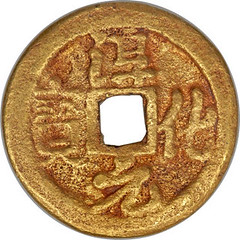
PREV ARTICLE
NEXT ARTICLE
FULL ISSUE
PREV FULL ISSUE
THE CHUN HUA GOLD CASH INGOT
The December 10, 2015 issue of Heritage Auctions' Classical Coin Newsletter has this article about an unusual early Chinese
gold coin, the Chun Hua gold Cash Ingot (AD 990-94). -Editor
 
This marvelous cast gold ingot, to be offered this Friday in Heritage's inaugural Hong Kong auction, made in the form of the ubiquitous "cash" coins of China, was made during the early decades of the Song Dynasty, one of the most vibrant episodes in world history. During this three-century epoch, China rose to become the wealthiest, most populous, and strongest nation state on the planet. The first Song emperor, Taizu (AD 960-976), after seizing power in a military coup, reunified most of China after the chaotic "Ten Kingdoms" period and instituted a series of reforms that strengthened the central government. Using incentives and subtle coercion rather than brute force, he convinced his rival warlords to retire in comfort and thus gained complete control of the unwieldly and rebellious army. He rebuilt the Civil Service by expanding the examination system and founded academies throughout China that encouraged freedom of expression and thought, leading to further reforms of the economy and society as well as a flowering of art and literature which continued for many generations. His brother and successor, Taizong, is also remembered as diligent, hardworking and concerned for the welfare of his subjects. Trade in luxury and staple goods flourished, and the Dynasty's military innovations, including the first use of gunpowder weapons, kept the central state intact for 300 years despite many dire threats from Mongol invaders. Science and technology brought forth a revolution through the invention of movable-type printing, hydraulic engineering and improved ship construction. Coins had been introduced in China many centuries before, and by the time of the Han Dynasty (ca, 200 BC-AD 220), the familiar bronze "cash" coins, cast round with a central square hole and Chinese characters giving the value, were being made in the hundreds of millions. The Song employed the same form of coinage, but also introduced the first government-printed paper money. While virtually all Chinese circulating coinage was of the token variety, made either of copper alloy, iron or (rarely) lead, a handful of gold pieces in the form of "cash" coins have survived. These are often termed "mortuary coins" after the practice of placing coins and other objects of mouth of the deceased, although it is not known if they were really used in this way. The reverse of our gold piece bears the characters Chunhua Yuanbao, in semi-cursive script, with two Buddhist figures on the obverse: the left side with Sudhana (Shancai Tongzi, Child of Wealth) standing on a lotus base, with hands in namaskara mudra; the right side with seated Guanyin, an Asian deity of Mercy, with auspicious clouds below. The obverse figures were first cast into the surface and then embellished by engraving. The Buddhist imagery is evidence of a ritual purpose. A small cache of similar gold pieces was found during repairs to a Buddhist temple on Wutai Mountain in 1988 and several examples reside in National Museum of China. The museum description of one such piece says the coin was likely made for Emperor Taizong's pilgrimage to Mount Wutai in the late 10th century. The dating comes from the form of legend, which was employed on copper and iron "cash" coins only from AD 990 to 994. To view the complete lot description, see:
Wayne Homren, Editor The Numismatic Bibliomania Society is a non-profit organization promoting numismatic literature. See our web site at coinbooks.org. To submit items for publication in The E-Sylum, write to the Editor at this address: whomren@gmail.com To subscribe go to: https://my.binhost.com/lists/listinfo/esylum All Rights Reserved. NBS Home Page Contact the NBS webmaster 
|